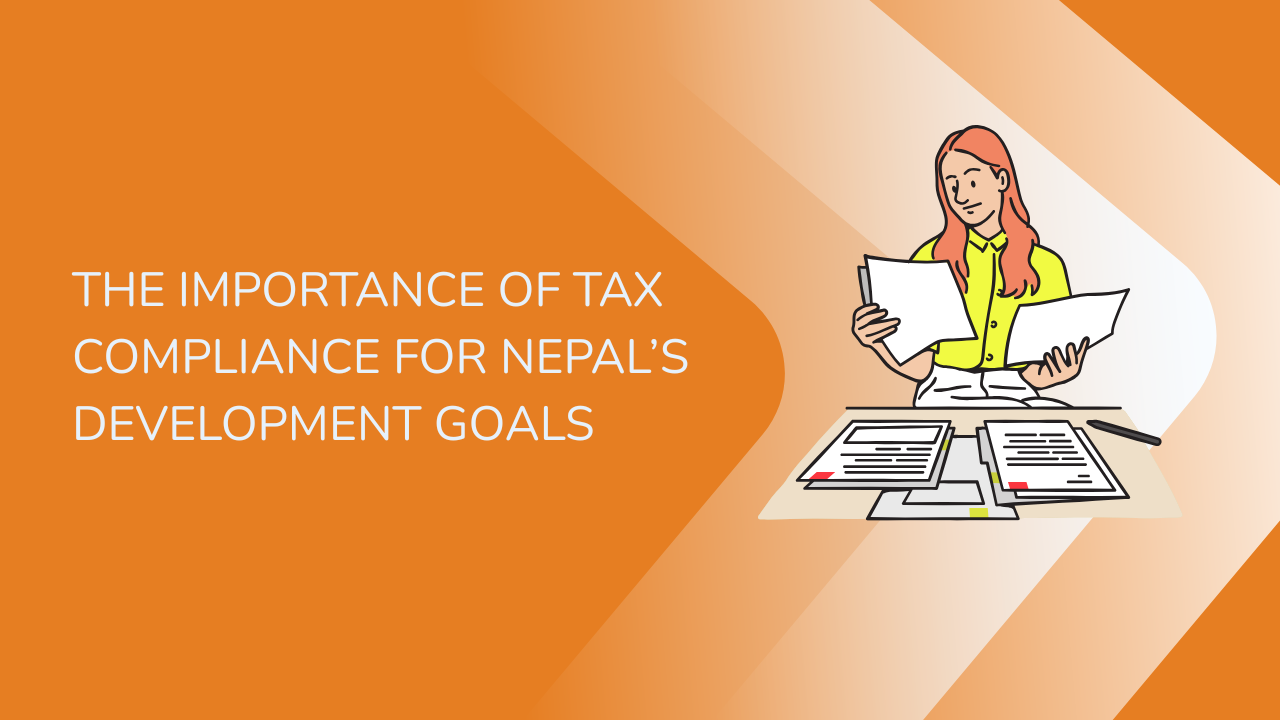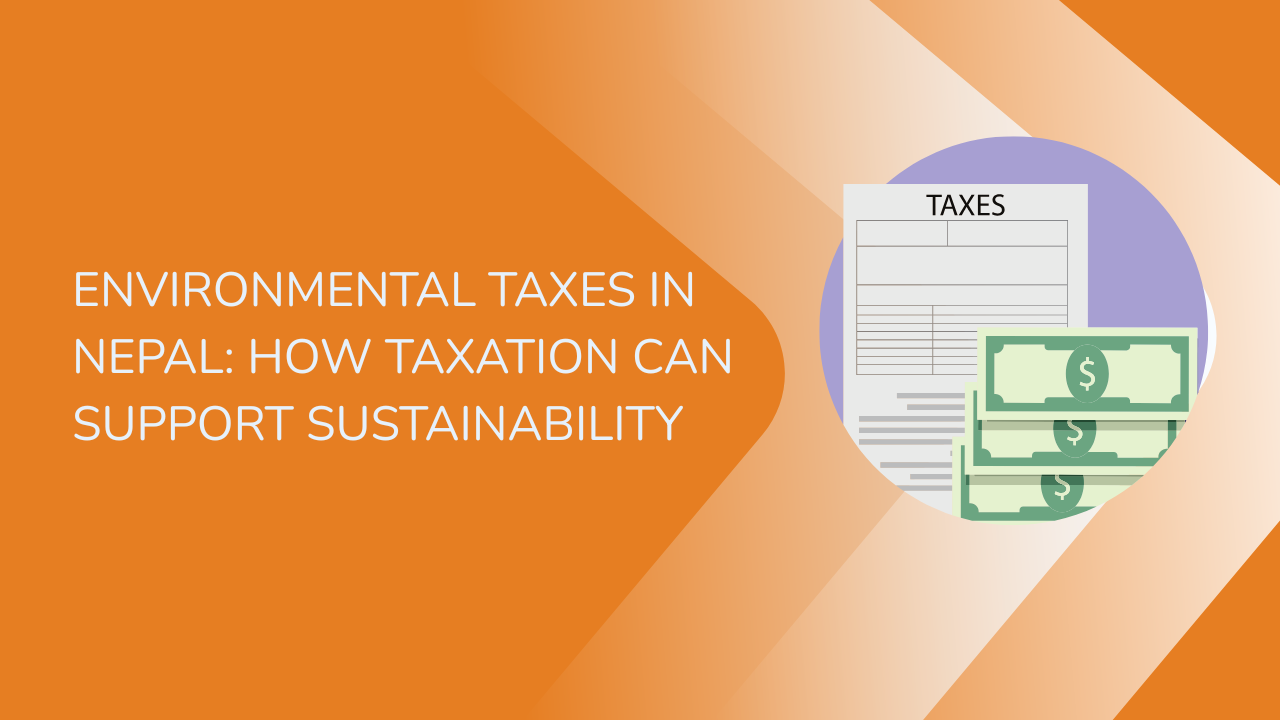Share this Article
Tax compliance serves as a fundamental pillar of Nepal’s economic framework, playing a pivotal role in fostering both growth and sustainable development. As the country aims to bolster its socio-economic status and realize its long-term developmental objectives, it must focus on ensuring that individuals and businesses adhere to tax regulations. The collection of tax revenues, when properly managed, is crucial for the government’s ability to provide essential services, fund infrastructure development, and foster economic growth.
1. Tax Compliance in Nepal: Definition and Importance
Tax compliance refers to the extent to which individuals, companies, and other entities comply with their obligations under Nepal’s tax system. This encompasses accurately filing tax returns, timely payment of taxes, adherence to legal requirements, and proper documentation of income and expenses. The Inland Revenue Department (IRD) is responsible for overseeing and regulating tax activities in Nepal, enforcing laws as defined in the Income Tax Act, 2058, and other relevant statutes. Tax compliance ensures that individuals and businesses contribute their fair share to the country’s development.
Categories of Taxes in Nepal
Nepal’s tax system can be broadly classified into two primary categories:
- Direct Taxes: These are taxes that are levied directly on the income, wealth, or property of individuals, businesses, and entities. Examples include income tax, property tax, and inheritance tax. Direct taxes play a significant role in government revenue, particularly in a growing economy like Nepal, as they ensure that income generated by individuals and businesses is properly taxed and distributed.
- Indirect Taxes: These taxes are levied on goods and services and are usually passed on to consumers in the form of higher prices. Key examples of indirect taxes in Nepal are Value Added Tax (VAT), excise taxes, and customs duties. These taxes are simpler to collect compared to direct taxes, as they apply to everyday transactions and goods consumed by the population.
A well-functioning and comprehensive tax compliance system is essential for Nepal’s economic stability. It ensures that the government has enough resources to meet the growing demand for public services, infrastructure development, and social programs.
2. Contribution of Taxes to Nepal’s Economic Development
Tax revenues directly contribute to the financing of various public services and projects that form the backbone of a nation’s development. The revenue generated through taxation plays a crucial role in sectors that drive economic progress. Below are some of the key areas in which taxes contribute to Nepal’s development:
2.1. Infrastructure Development
Infrastructure is essential for economic development. In Nepal, road networks, bridges, airports, and utilities need continuous investment to keep up with population growth and economic activity. Taxes play an integral role in financing these infrastructure projects, which are critical for stimulating trade, improving connectivity, and attracting investments.
Government expenditure in the infrastructure sector boosts economic productivity by reducing transportation costs, increasing business efficiency, and creating employment opportunities. For instance, the Kathmandu-Terai Fast Track project, designed to reduce travel time between Kathmandu and the Terai region, relies on tax revenue to ensure its timely completion. Such projects help support long-term economic growth by providing the necessary transportation links between urban and rural areas.
2.2. Healthcare and Public Health
Tax revenues also fund healthcare services that ensure the health and well-being of the population. In Nepal, a healthy and productive workforce is critical for economic growth. Taxes are used to finance the construction of hospitals, health facilities, medical infrastructure, and crucial health programs such as immunization drives and maternal and child health services.
The importance of a strong healthcare system was highlighted during the COVID-19 pandemic when tax revenues were used to procure vaccines, establish treatment centers, and provide relief packages. These investments in health help create a resilient society capable of recovering from health crises and contributing to the economy.
2.3. Education and Human Capital Development
Education is the cornerstone of sustainable development. A well-educated population is more productive and capable of driving innovation and economic growth. Tax revenues are used to fund education programs that build human capital. This includes building schools, providing scholarships, offering subsidies for students from disadvantaged backgrounds, and training teachers.
Investing in education enhances human capital by equipping individuals with the knowledge and skills needed to succeed in various sectors, such as agriculture, technology, healthcare, and services. As Nepal continues to expand its education sector, tax compliance becomes more crucial to fund these programs and bridge the gaps in educational access.
2.4. Social Welfare and Poverty Reduction
Taxes help fund social welfare programs aimed at alleviating poverty and supporting vulnerable populations. In a country like Nepal, where a significant portion of the population lives below the poverty line, tax revenues play a vital role in providing financial assistance to those in need.
Programs such as the Social Security Fund, which offers financial aid to the elderly, disabled, and low-income families, are directly financed by taxes. By strengthening tax compliance, the government can expand the scope of these programs, ensuring more equitable distribution of wealth and reducing social inequality.
3. Challenges to Tax Compliance in Nepal
Despite the importance of tax compliance for economic development, several challenges hinder effective tax collection in Nepal. These obstacles need to be addressed to fully unlock the potential of the tax system in supporting the country’s development goals.
3.1. Informal Economy
A significant portion of Nepal’s economy operates informally, with many businesses and individuals not registered with the government or not paying taxes. This informal sector includes small businesses, home-based enterprises, and agriculture, which account for a substantial share of the country’s economic activity.
The informal economy complicates tax collection and diminishes the government's ability to fund essential services. To tackle this issue, the government must incentivize businesses to formalize their operations, provide education on the benefits of registration, and create a conducive environment for small businesses to thrive.
3.2. Tax Evasion and Corruption
Tax evasion is a persistent problem in Nepal, with some individuals and businesses using illegal means to avoid paying taxes. This undermines the effectiveness of the tax system and reduces the revenue available for government programs. Corruption within tax administration further exacerbates this issue, as it results in non-compliance and loss of trust in the system.
To combat tax evasion, the government must strengthen enforcement mechanisms, improve transparency in the tax administration process, and educate citizens about the long-term benefits of tax compliance for national development.
3.3. Complex Tax System
The complexity of Nepal’s tax system can be a significant barrier to compliance. Many small businesses, in particular, find it difficult to navigate the rules and regulations, leading to mistakes and delays in tax filings. The complexity of the system also results in confusion and frustration, which can discourage businesses from paying taxes.
Simplifying the tax code and providing support for taxpayers, including training programs and tax consultation services, can help mitigate this issue. By making the system more user-friendly, the government can increase compliance and ensure that taxes are paid promptly and accurately.
3.4. Lack of Trust in Government Institutions
A lack of trust in government institutions can reduce taxpayer morale. If citizens believe that their tax payments are not being used effectively or that the government is corrupt, they may be less inclined to comply with tax laws. Building public trust is essential for improving tax compliance.
The government must be transparent about how tax revenues are spent, ensuring that public funds are used efficiently for development projects and public services. When citizens see the direct benefits of their tax payments, they are more likely to feel motivated to comply.
4. Opportunities for Improving Tax Compliance in Nepal
Despite the challenges, there are significant opportunities for improving tax compliance in Nepal. These opportunities could help bolster the country’s tax revenues and further contribute to its economic development.
4.1. Digitalization of Tax Systems
One of the most promising developments for enhancing tax compliance is the digitalization of tax systems. By implementing technology-driven solutions, the government can simplify the process of tax filing, reduce the risk of errors, and increase transparency. Online platforms can make it easier for businesses and individuals to file their taxes, track their payments, and access relevant tax information.
4.2. Strengthening Tax Education and Awareness
Raising awareness about the importance of tax compliance is crucial. Many individuals and businesses may not fully understand their obligations or the benefits of paying taxes. Tax education programs can help fill this gap, providing taxpayers with the information they need to comply with the law.
Public awareness campaigns should focus on the positive impact of taxes on infrastructure, health, education, and poverty reduction. The government should also educate citizens on the legal consequences of non-compliance.
4.3. Encouraging Voluntary Compliance
Voluntary compliance is an essential component of an effective tax system. The government can encourage taxpayers to voluntarily comply with tax laws by offering incentives such as tax deductions, exemptions, or recognition programs. By rewarding compliant taxpayers, the government can motivate others to follow suit.
4.4. Enhancing Transparency in Public Spending
Transparency in the use of tax revenues is critical for fostering trust and encouraging compliance. When citizens can see how their taxes are being used for public services and development projects, they are more likely to support the tax system.
The government should regularly publish reports on the allocation and expenditure of tax revenues, ensuring that citizens are informed about the impact of their contributions.
5. Conclusion: Building a Sustainable Future through Tax Compliance
Tax compliance is essential for the successful achievement of Nepal’s economic development goals. By ensuring timely and accurate tax payments, the country can secure the financial resources needed to invest in infrastructure, healthcare, education, and social welfare programs. However, to realize the full potential of tax compliance, Nepal must overcome challenges such as the informal economy, tax evasion, and corruption.
Through digitalization, public education, and greater transparency, the government can create a tax system that is efficient, equitable, and supportive of the country’s development aspirations. Both the government and citizens must work together to build a strong foundation for sustainable economic growth, ensuring that Nepal’s future is prosperous and resilient.
Categories:
Tax Information
Tags:
EcommerceTips







